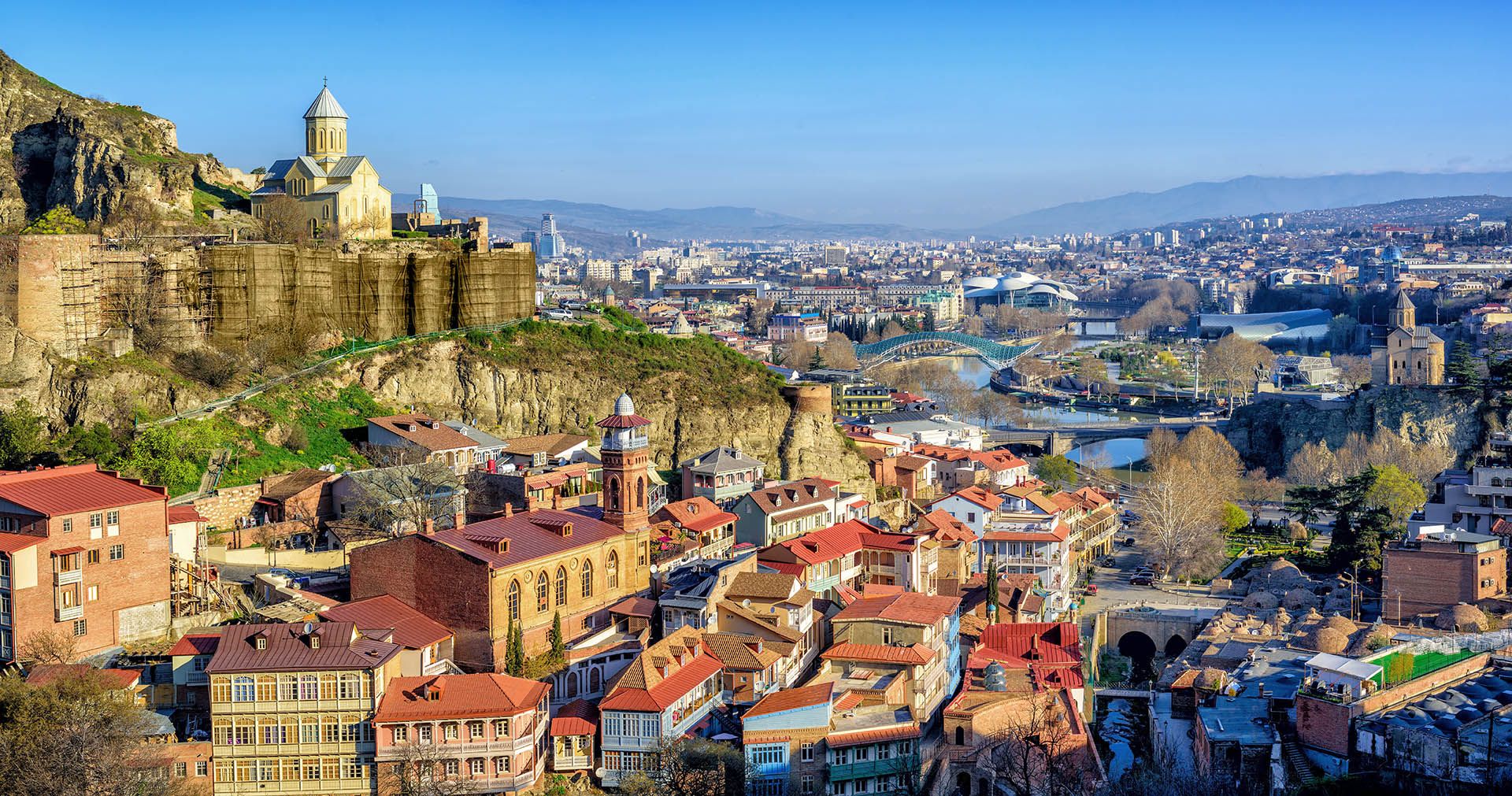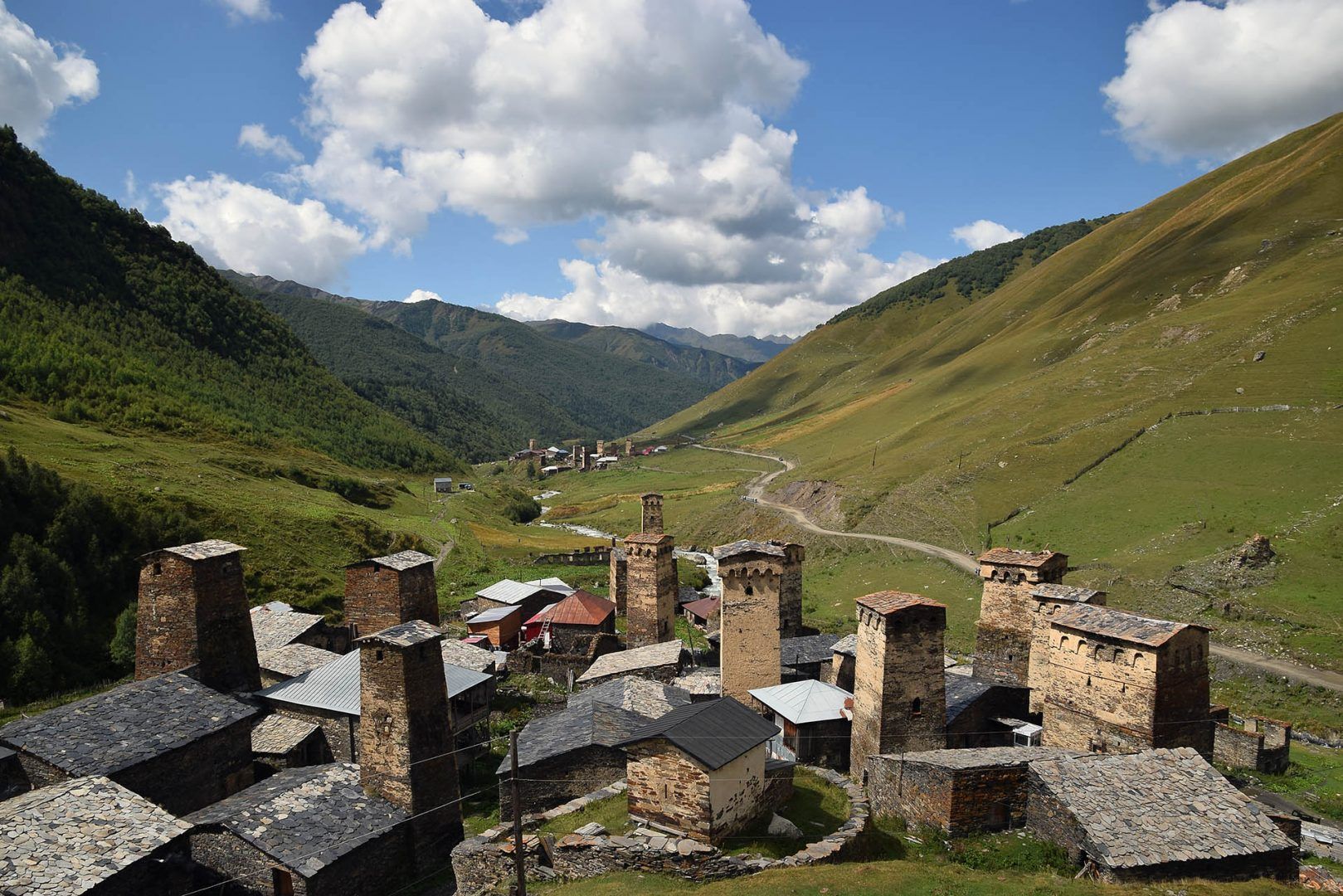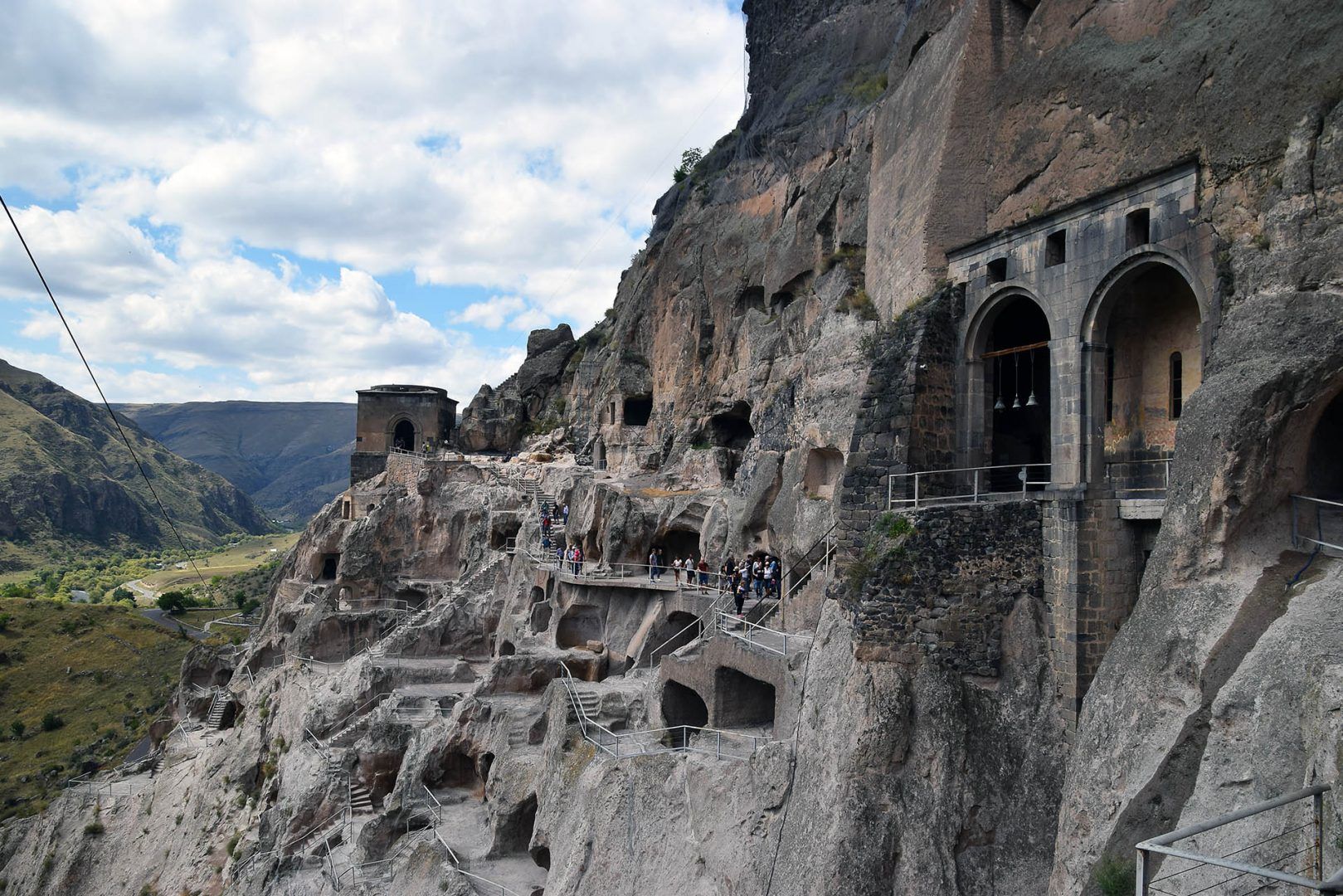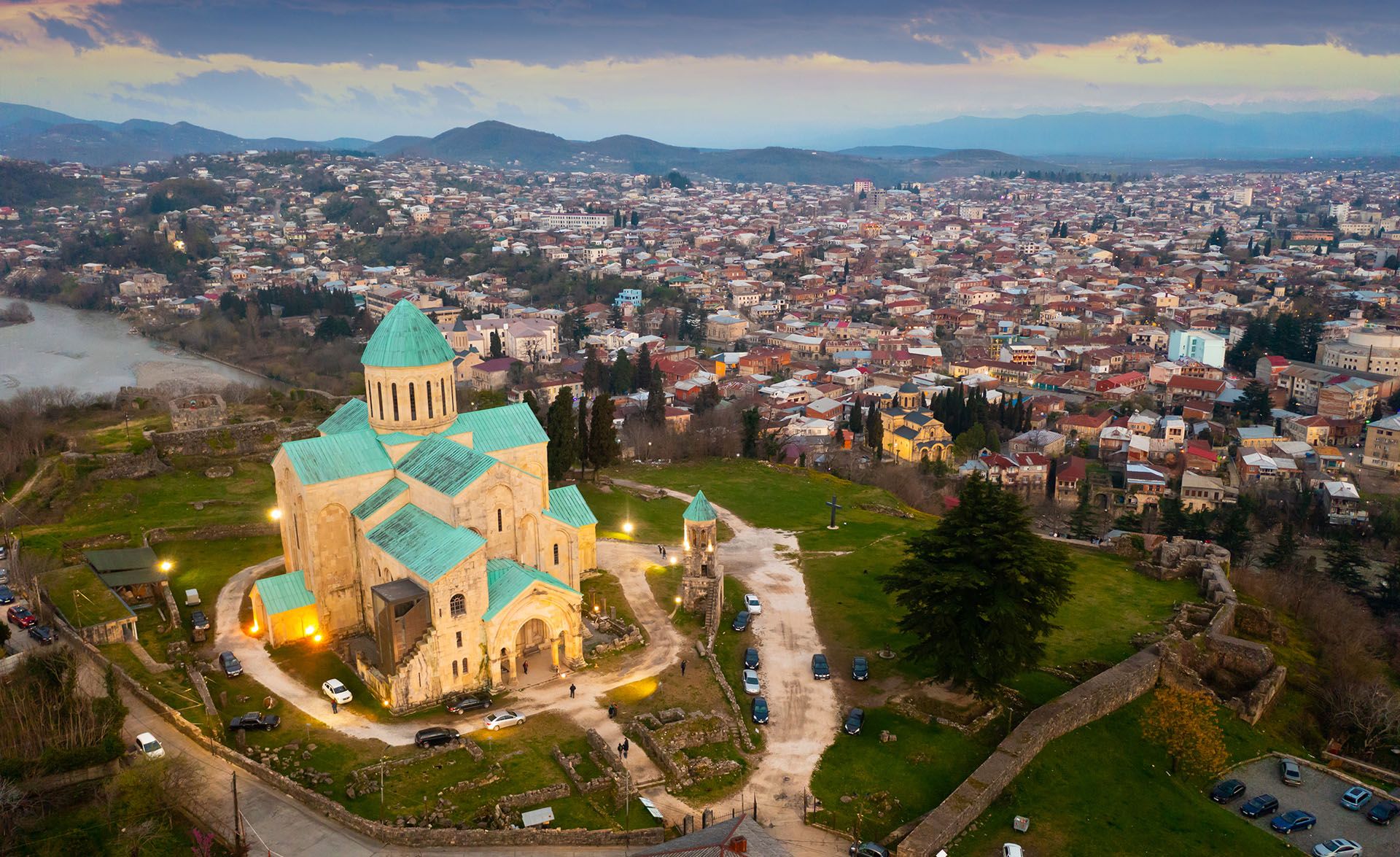- Activity
- Nature & Wildlife
- Authentic Experiences
- History Culture Heritage
- Georgia
- Tbilisi
- Batumi
- Inspiration
- See & Do
Planning your own trip? Prepare for your trip
Use Rough Guides' trusted partners for great rates
Book your individual trip, stress-free with local travel experts
Georgia long attracted visitors from neighbouring countries – and there's really no wonder. In addition to its wealth of culture and natural beauty, it is also one of the most budget-friendly travel destinations. In this article, we cover the best things to do in Georgia, from stunning mountain hikes to cosmopolitan cities, ancient monasteries and - of course - some of the world's best wine.
The information in this article is inspired by The Rough Guides guidebooks — your essential guides for visiting the world.
Any exploration of Georgia will likely begin with its welcoming capital city, Tbilisi. A fascinating cocktail of beautiful 19th-century merchant homes, blocky and grandiose 20th-century Soviet edifices, and innovative 21st-century architecture – Tbilisi is instantly charming.
With a vibrant coffee-shop culture, as well as fantastic wine bars pretty much everywhere you turn, you can guarantee there’ll be always somewhere to stop for a restorative drink. These experiences are just a taste of the countless things to do in Georgia.
For a well-presented and informative tour through Georgia’s tumultuous history, there’s nowhere better than Tbilisi’s National Museum. Art lovers will be enthralled by the National Gallery and the Georgian Museum of Fine Arts. Don't skip the baths district and the city’s famous nightclub scene, and the fantastic outdoor ethnographic museum and the 16th-century Narikala Fortress make great places for a spacious stroll.
Find more accommodation options to stay in Tbilisi.

Panoramic view of Tbilisi Old Town © Boris Stroujko/Shutterstock
A world away from Tbilisi’s cosmopolitanism, the region of Svaneti nestles in Georgia’s northwest among the towering peaks of the Caucasus Mountains. Now a major draw for trekkers, this beautiful corner of the country has a long history of rugged independence. Even the Soviets achieved only tenuous control here.
The landscape is dotted with hundreds of defensive stone towers, a necessary feature in an area often riven by family blood feuds. Svaneti’s main town of Mestia is an extremely welcoming place for hikers.
There are walks here for all abilities, from short afternoon strolls up to 2-week arduous expeditions. Perhaps the most popular is the 4-day trek between Mestia and the beautiful remote village of Ushguli, where you’ll find a huge concentration of Svan towers.
Among other best things to do in Georgia for hikers is a trek from Mestia to the Koruldi Lakes, which takes several hours and is accompanied by spectacular views of the mountains and valleys. The lakes are fed by melting snow from the glaciers and snowfields of the local mountain peaks and are of interest to visitors for their beauty.

Hiking in Svaneti is one of the best things to do in Georgia © Owen Morton
Georgia claims, with some authority, to have been the first country in the world to develop the art of wine-making, with a tradition that dates back some 8000 years. The majority of Georgia’s vineyards can be found in the eastern province of Kakheti, and there are few more pleasant ways to spend the day than making a leisurely tour between the region’s wineries and sampling the wares.
The Italianate town of Sighnaghi – perched attractively on a hilltop overlooking a valley packed with vineyards – is perhaps the best place to base yourself, with its laid-back and friendly vibe.
Kakheti has plenty more to offer than just a good tipple. Here you’ll find the 19th-century stately home of the Georgian prince Alexander Chavchavadze, and the small town of Gremi is worth a visit for its imposing cathedral-fortress. Meanwhile, the enormous 11th-century Alaverdi Cathedral is a beautiful and atmospheric work of medieval architectural genius.

Harvesting grapes in a vineyard in Kakheti region, Georgia © Yulia Grigoryeva/Shutterstock
The jagged mountains of the Caucasus give way to a gentler steppe-like landscape, and it’s here, carved into the wall of the Kura River valley, that you’ll find one of the country’s most remarkable sights: the Vardzia cave monastery.
Dating from the 12th century, this labyrinthine complex of tunnels, chapels and wine cellars was home to a community of monks. This is a source of national pride due to its links with Queen Tamar, one of Georgia’s most successful historic rulers.
There’s also an excellent viewpoint of the site from across the river, and you can enjoy hikes in the surrounding hills or visit the nearby imposing Khertvisi Fortress.

Vardzia monastery, Georgia © Owen Morton
While many of Georgia’s destinations are steeped in history, Batumi looks more to the future. Set on the Black Sea coast, Georgia’s second-largest city boasts crazy architecture along the seafront Bulvar. Batumi’s pebble beach is extremely popular, particularly with Russian tourists, and it’s also one of the best things to do in Georgia to experience the local nightlife.
More sedate attractions in the area include the lovely Botanic Gardens, a vast park with meandering paths set on a cliff above the Black Sea, as well as a pair of Byzantine fortresses just outside town. But perhaps the greatest draw is the local cuisine. Batumi is without a doubt the best place in Georgia to sample the Adjaran khachapuri, a super-calorific but super-delicious cheesy bread treat topped with egg and dripping with butter.
Find more accommodation options to stay in Batumi.

Batumi, Georgian resort city and Black Sea port © nektofadev/Shutterstock
The spa town of Borjomi was founded in the 19th century by Russian troops on their way to the front lines of the Russo-Turkish War. En route, they found a mineral spring here and concluded the water had healing properties. Borjomi water – which is fizzy and salty – subsequently became famous across Georgia and Russia, and was one of the most popular drinks in the USSR.
Borjomi town is an attractive place, with a lovely central park – in which you can sample the famous water straight from the source – and a marvellously eclectic local museum, which features diverse exhibits.
For outdoor lovers, the nearby Borjomi National Park offers hiking opportunities, as well as other activities including horse riding and mountain biking. Take the route to the summit of the park’s Mount Lomismta for sweeping views that can extend all the way from Turkey to Russia.
Find more accommodation options to stay in Borjomi.

Mineral Water Park in Borjomi, Georgia © Andrii Lutsyk/Shutterstock
A unique natural and cultural monument, the Katsakhi Pillar is located in the Imereti region of western Georgia. It is a tall limestone monolith that rises about 40 metres above the landscape. What makes the place even more outstanding is the presence of a small medieval hermitage located at the top of the pillar.
The pillar was not explored until 1944, which changed in 1999. As a result of research, the ruins of the monastery were found to belong to the approximate period of the 9th-10th centuries. It is believed that for centuries the monastery served as a place of solitude and prayer for monks seeking spiritual solitude.
In order to preserve the Katsakhi Pillars and the monastery, access is restricted. Nevertheless, you can admire the view of the majestic monument from afar, as well as explore the surrounding beautiful Georgian countryside.

Katskhi Pillar © Shutterstock
Just over 140 miles to the west of Georgia's capital Tbilisi, Kutaisi is a city in flux, perfect for adventure, food and some exceptional spa time.
Georgia's wild-looking monasteries and cathedrals are often found in hard-to-reach locations on the side of mountains. But Kutaisi has its very own gem, in the form of Bagrati Cathedral, an 11th-century cathedral set on top of Ukimerioni Hill. Cross the Jachvis Khidi (Chain Bridge) and ready your thighs to hike up the cobbled streets for a great view from the top.
One of the best things to do in Georgia is to stop off at Kutaisi's Green Bazaar on the way back into town to pick up some pre-hike picnic snacks. Food is one of Georgia's biggest draws, and Kutaisi's market is worth a rummage. Plump ripe tomatoes, churchkhela (sweet 'sausages' made of nuts and apple juice toffee), and sackfuls of cherries and spices — this is a perfect place to find fresh produce.
A famous sight in Kutaisi is the Colchis fountain in the city centre. The fountain is known primarily for its decorations in the form of enlarged examples of archaeological artefacts that have been found throughout Georgia.
Find more accommodation options to stay in Kutaisi.

Bagrati Cathedral in Kutaisi © Shutterstock
Georgia's cities are special, but the outdoor scenery is some of the most beautiful in the Caucasus. One of the best things to do in Georgia is to take a trip to some of the country's big-hitter sites less than an hour from big cities.
Okatse Canyon is a good place to test your fear of heights to the limit, thanks to a new walkway that juts out over the side of a cliff. Built in 2014, the walkway runs for 700m along the 14km canyon and is part of a longer 4km round walk from the visitor centre. Most of the walk is shaded, ideal during Georgia's roasting summers.
Taxi drivers will try to encourage you to add Martvili Canyon to your itinerary. You can take an inflatable boat up and down the canyon. The ride up is pretty tame, but the water is an incredible green. After the hike around Okatse, it's good to kick back and enjoy the float.
A great option for a day trip from Tbilisi would be a visit to Dashbashi Canyon. Carved by the stream of the Khrami River, the canyon is perfect for walking and enjoying the local scenery.

Okatse Canyon in Georgia © Shutterstock
The Kazbegi area is a popular destination in Georgia, located in the mountainous Mtskheta-Mtianeti region. The centre of this region is the town of Stepantsminda, surrounded by mountains.
Kazbegi is known for the hiking opportunities it provides. One of the most famous trails here is the hike to the Gergeti Glacier on Mount Kazbegi. Apart from the breathtaking mountain scenery, you will also find the Gergeti Trinity Church (Tsminda Sameba) here.
While here, it's also worth a visit to The Stepantsminda Historical Museum, which features exhibitions on Caucasian culture.

Gergeti Trinity Church (Tsminda Sameba) © Shutterstock
One of the best things to do in Georgia to immerse yourself in history is to visit a UNESCO World Heritage site - Jvari Monastery. The monastery is one of the oldest and most important religious buildings in Georgia and dates back to the 6th century. It is a rare example of an early medieval Georgian building that has survived almost unchanged to the present day.
Jvari Monastery is of great religious importance because it is believed that St. Nino, the evangelist who brought Christianity to Georgia, installed a wooden cross at the site of a pagan temple in the 4th century.

Jvari monastery in Georgia © Shutterstock
The Ananuri Fortress, more commonly known as Ananuri Castle, is a castle complex located about 72 km from Tbilisi, near the Aragvi River. The castle was the residence of a feudal dynasty and was the scene of many battles.
The complex consists of two main fortified parts, the upper and lower fortifications, which include defensive walls, towers and various structures. The upper fortification is well preserved, while the lower one is mostly a ruin. There are also two churches on the grounds: the smaller Church of the Virgin and the larger Church of the Mother of God.

Ananuri fortress in Georgia © Shutterstock
Feel inspired? Check out our Rough Guides books and start planning your perfect trip.
If you prefer to plan and book your trip without any effort and hassle, use the expertise of our local travel experts to make sure your trip will be just like you dream it to be.
We may earn a commission when you click on links in this article, but this doesn’t influence our editorial standards. We only recommend services we genuinely believe will enhance your travel experiences.
written by
Owen Morton
updated 03.08.2023
Owen Morton is never happier than when exploring new places, with a particular fondness for wandering the former Soviet world and the Middle East. He is the author of the upcoming Rough Guide to Georgia, Armenia and Azerbaijan, and has written for Rough Guides' Make the Most of Your Time on Earth compilation, as well as regular contributions to the Rough Guides and Insight Guides blogs. When not exploring the world, he entertains himself by writing a blog about 1980s cartoons. His favourite animal is the wonderfully expressive and permanently furious manul. Follow him on Instagram at @owenmortonmanul.
Use Rough Guides' trusted partners for great rates
Discover Georgia's most captivating stories